慎小嶷 《十天突破雅思口语》总结1精编版
《慎小嶷 十天突破IELTS写作完整真题库与6 9分范文全解 》读书笔记思维导图

014
附录C 家庭类真题库 与各分数段范文官 方 题库里的“尼斯...
本书是畅销书《十天突破雅思写作》的姐妹篇。书中收录了在亚太、欧洲和北美三大考区历年来所使用的雅 思写作完整真题库,根据不同分数段的范文特点对范文的写作手法和语言特色进行了详尽的比较与鉴别,并且紧 密地结合了剑桥官方的新评分细则。本书分册里还提供了详尽的雅思地图题(Map)写作指南,而且全书解释例 句均取自剑桥官方唯一指定的CambridgeAdvancedLearner’sDictionar y.本书还附赠由两位英籍播音员朗读 的高分范文音频,方便读者随时随地学习实战范文。
09 Day 6 明朝那些事儿: 文化类真题库与...
011
十天突破IELTS写作 完整真题库与6-9...
010
Day 7 低碳生活 Going Gre...
附录A 动植物类真题
012 库与各分数段范文剖 析
目录
013 附录B 旅游业类真题 库与各分数段范文剖 析
015
附录D 女性类真题库 与各分数段范文剖析
写好雅...
附录A 动植物类真题库与各分 数段范文剖析
附录B 旅游业类真题库与各分 数段范文剖析
附录C 家庭类真题库与各分数 段范文剖析
附录D 女性类真题库与各分数 段范文剖析
附录E Task-1 官方题库里的 “尼斯...
感谢观看
读
书
笔
记
03 英文自序 Preface
04 Day 1 学而时习之: 教育类真题库与各...
05 Day 2 第一生产力: 科技类真题库与各...
06 Day 3 真相与谎言间 的永恒博弈:媒体...
目录
07 Day 4 领导的艺术: 政府类真题库与各...
十天突破雅思口语低分的技巧
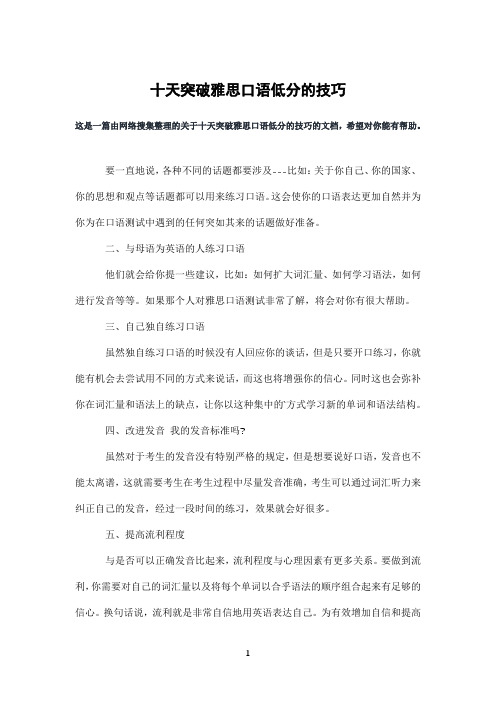
十天突破雅思口语低分的技巧
这是一篇由网络搜集整理的关于十天突破雅思口语低分的技巧的文档,希望对你能有帮助。
要一直地说,各种不同的话题都要涉及---比如:关于你自己、你的国家、你的思想和观点等话题都可以用来练习口语。
这会使你的口语表达更加自然并为你为在口语测试中遇到的任何突如其来的话题做好准备。
二、与母语为英语的人练习口语
他们就会给你提一些建议,比如:如何扩大词汇量、如何学习语法,如何进行发音等等。
如果那个人对雅思口语测试非常了解,将会对你有很大帮助。
三、自己独自练习口语
虽然独自练习口语的时候没有人回应你的谈话,但是只要开口练习,你就能有机会去尝试用不同的方式来说话,而这也将增强你的信心。
同时这也会弥补你在词汇量和语法上的缺点,让你以这种集中的`方式学习新的单词和语法结构。
四、改进发音我的发音标准吗?
虽然对于考生的发音没有特别严格的规定,但是想要说好口语,发音也不能太离谱,这就需要考生在考生过程中尽量发音准确,考生可以通过词汇听力来纠正自己的发音,经过一段时间的练习,效果就会好很多。
五、提高流利程度
与是否可以正确发音比起来,流利程度与心理因素有更多关系。
要做到流利,你需要对自己的词汇量以及将每个单词以合乎语法的顺序组合起来有足够的信心。
换句话说,流利就是非常自信地用英语表达自己。
为有效增加自信和提高
流利程度,你需要通过大量工作来提高你的词汇量和语法知识。
/。
10天备考雅思7分心得~

1.口语(1)慎小嶷的《十天突破雅思口语9》慎小嶷的书真心是极好的啊,难怪这么多人都推荐~要好好看这本书至少两遍!因为内容很多,看完之后忘记的快~我的建议是,首先花几天把整本书仔细过一遍了解基本的信息。
之后你就会知道哪些是自己需要背的东西(比如很多地道的英语表达,单词等等),之后就开始每天不停地复习这些需要背的东西,因为如果你不是背的滚瓜烂熟的话,在考试那种混乱的状态下根本就想不起来╮(╯_╰)╭。
(2)关注人人“雅思”公共主页(就搜“雅思”就好)这个网站真的超级给力,我自己不试过不相信啊。
雅思哥每个月都会做预测的,他的预测真的很准,每一部分的参考性都非常大!!!所以从今天开始起,每天都要去刷下这个网站,看看有没有出新的预测信息,及时更新自己的信息!!!!(因为它常常会补充更新的)这个对于口语的话就是,考试前10-15天开始,就可以对照雅思哥的预测题库开始一个个准备了(我因为离考试只有一周时间,所以准备的比较匆忙,但是基本上4整天也全部准备完了。
不过我希望你可以把时间算的宽裕些,我那样实在太赶)。
他的口语题库虽然有点多,但是口语Part2和Part3的命中率是百分之百啊!!!Part1的话也必然要准备一下,但是要把更多的精力放在Part2和Part3,特别是Part2,必须每一个都准备过背牢!因为P2这个是可以完全百分百准备好的,而P1和P3相对比较随机,都是考官想问什么就问什么,而且有的考官会问很多,比如我的考官P1和P3都分别问了我10来个不同的问题啊⊙﹏⊙PS:考试的时候必须是把它当成对话,就算是你背得再熟,你也要感觉是对话一样,要跟考官互动,眼神交流,这个真心非常重要!你进到考场就知道,要是没有跟考官交流,气氛就会很神奇。
PPS:再次强调!重点准备Part2!然后因为你时间多,所以P1和P3也认真准备下!PPPS:哦还有最重要的一点就是合并话题,学会套用!这个慎小嶷的书里面会教的,也就是你准备的一个topic,可以套到很多很多topic上,就可以大大减少工作量啦!PPPPS:慎小嶷的书中有很多的topic例子!不过不到万不得已,不要完全背里面的例子哦,对照着雅思哥预测里面的topic去慎小嶷的书中找相关的例子,学习地道的表达,但是尽量都是自己的故事自己的想法,因为你想想,慎小嶷这是绝对的畅销书啊。
超详细雅思备战与考试经验总结

口语:《十天突破雅思口语》、慎小嶷和无忧雅思的预测和蹲点听力:黑眼睛807词汇真题一雅时,做完黑眼睛之后,第一次做剑6T1L我只有5.5,通过一个月的练习,最终考试成绩是6.5。
4-7反复做了两遍,精听了两遍,听写大意一遍,可最终还是觉得心里没底。
分析到底答案是如何构造出来的:1.连词引出答案。
①这一套路我们很熟悉的,例如:and, but, besides, in addition这一类词后说出的很可能是答案。
②在题干中出现逻辑关系,如并列、转折等,我们可根据空格前后的词大致确定要填的词的词性,甚至猜到原词。
2.“重点词”引出答案。
如what’s more, important之类的词,它们后面的内容可能是答案。
3.原文中重复题干(注意:重复题支则有可能不是答案而是干扰选项)关键词,下一句可能就是答案。
4.原文出现题干关键词的同义词、词组或替换的句子,那句话可能是答案。
大家有兴趣可以拿剑4做这样的练习,对照文本和题目去研究答案是如何设置的,我在这里只抛砖引玉。
练习过后我们会对雅思听力更有信心,考试时听答案会更有针对性。
我用了三个月左右的时间听写了剑桥4-7,写了101页A4纸阅读:《英语词汇的奥秘》《GRE & GMAT阅读难句教程》《最新雅思阅读胜经:平行阅读法》《Cambridge IELTS》4-7Tip 1:阅读从总体着眼掌握文章大意;读到每段总结段落大意,随时总结层意。
Tip 2:总结错题原因、常错题型。
Tip 3:挑出做的不顺的文章认真分析,特别是总结答案到底是什么。
答案可能是段意、层意,可能是逻辑关系词后的句子等。
总之,只要认真发掘,其中的奥妙我们不难发现。
Tip 4:珍惜真题,把握真题,一遍遍的做,直到掌握出题人的意图。
模拟题良莠不齐,很多都起到误导的反作用。
Tip 5:“读懂了”,题为什么还错?有时我会问自己,为什么我读懂了文章题却答不对?仔细想想,是真的“读懂了”还是“感觉自己读懂了”?真实的原因是:没读懂。
雅思预测:2011.8.27雅思口语Part1预测【慎小嶷】
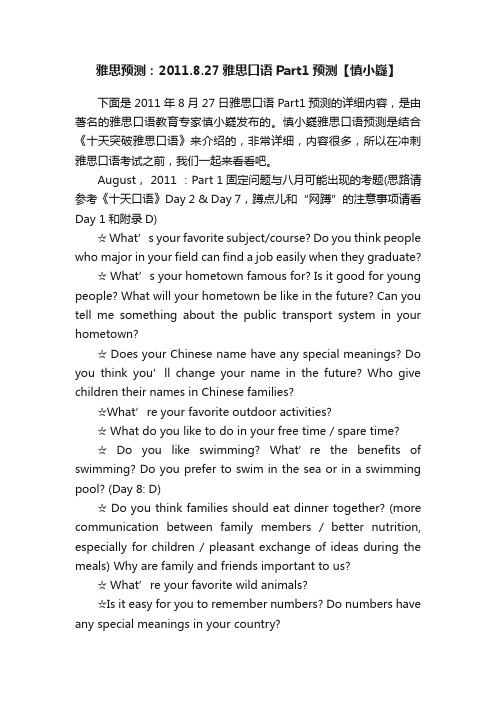
雅思预测:2011.8.27雅思口语Part1预测【慎小嶷】下面是2011年8月27日雅思口语Part1预测的详细内容,是由著名的雅思口语教育专家慎小嶷发布的。
慎小嶷雅思口语预测是结合《十天突破雅思口语》来介绍的,非常详细,内容很多,所以在冲刺雅思口语考试之前,我们一起来看看吧。
August, 2011 :Part 1固定问题与八月可能出现的考题(思路请参考《十天口语》Day 2 & Day 7,蹲点儿和“网蹲”的注意事项请看Day 1和附录D)☆ What’s your favorite subject/course? Do you think people who major in your field can find a job easily when they graduate?☆ What’s your hometown famous for? Is it good for young people? What will your hometown be like in the future? Can you tell me something about the public transport system in your hometown?☆ Does your Chinese name have any special meanings? Do you think you’ll change your name in the future? Who give children their names in Chinese families?☆What’re your favorite outdoor activities?☆ What do you like to do in your free time / spare time?☆ Do you like swimming? What’re the benefits of swimming? Do you prefer to swim in the sea or in a swimming pool? (Day 8: D)☆ Do you think families should eat dinner together? (more communication between family members / better nutrition, especially for children / pleasant exchange of ideas during the meals) Why are family and friends important to us?☆ What’re your favorite wild animals?☆Is it easy for you to remember numbers? Do numbers have any special meanings in your country?☆ Do you often do housework at home? (十天口语剑8版p.25下方)☆What’s your favorite kind of weather?☆ What’s your favorite food? What’s the most popular food in China?☆ Have you e ver been to a concert? Did you like it? What kind of music do you like? What are the differences between going to a concert and listening to CDs? (We can hear singers or bands perform live in concerts. / We sing along and dance and scream with people who love the same music / But CDs give us far more choices. These days, concert ticket prices can be sky-high so it’s unlikely we can go to all the concerts we wish we could go to…)☆ Do you live in a house or a flat? Which is your favorite room in your house/ flat? Do you think there is anything that should be improved in your house/flat?☆ Do you think science is important to our lives? Why? (Possible Answers: Physics helps us figure out how things work. / Chemistry shows us the structure of the world and how materials interact with each other. / Biology teaches us where living things come from and what living things need to survive…) ☆Which kind of technology are you most interested in? (biotech / digital technology / space technology/ AI or artificial intelli gence…)☆What're your favorite public holidays? Are public holidays important to us? What do you do on public holidays?☆ What was your favorite type of movie when you were a child? Do you still like this type of movie now? Do you prefer to watch movies in movie theaters/ cinemas or to watch DVDs at home?Do you often visit museums? Do you think museums areimportant to our lives? When was the last time you visited a museum? Is it a good idea for museums to sell goods to visitors?(A Sample Answer: It may be a nice idea if museums can’t get enough funding and need extra money to support themselves. And some souvenirs sold at museum gift shops are neat! But museums won’t be able to serve visitors well if they simply focus on doing business.)Did you like reading books when you were little? What were your favorite kinds of books? What kind of books do you like these days? Do you like writing letters?How should young people treat elderly people? (treat them with respect / pay our grandparents a visit from time to time / learn from them / help elderly neighboursWhat do you think is happiness? (It’s an emotion. / Basically, it means enjoyment of life. / Some people believe wealth can lead to happiness. / But actually happiness is more about being emotionally rewarded than about just being wealthy. / That’s why many super rich people are actually very unhappy.) ☆ Did you give or re ceive any gifts recently? What were they? Do you prefer to give gifts or to receive gifts?☆ Why is money important to our lives?☆ What do you collect? Why do people collect things? (Day 7:Topic 10)☆ Do birds have any special meanings in China? (Day 7: T opic 19 )☆ How do you get news? Do you read newspapers or magazines?☆ What sports did you play when you were a child? What’re the differences between sports played by boys and sports played by girls? What’re your favorite sports now?Where do you meet new people? Where did people meet new people in the past?Do you like shopping?☆ Do you like drawing and painting? What were your favorite kinds of drawings or paintings when you were a child? Do you think children can benefit from drawing and painting?☆ D o you like taking photos? Do you like to take photos outdoors or indoors? Is photography popular in China?☆ What kinds of pets do Chinese people like to keep? Do people of different ages prefer different pets?Do you think air travel is important to us? (It sure is. It’s convenient, comfortable and … fun. Some people are concerned about its safety but according to statistics air travel is actually safer than car rides.)☆ What're your favorite flowers? Do you think flowers are important to Chinese people? Do you often give others flowers as gifts? Do flowers have any special meanings in China?☆Do you like dancing? Have you learned how to dance? Why do so many young people like dancing today?Have your neighbors help you with anything? Do you prefer to have old people or young people as your neighbors?Do you prefer to use emails or letters?☆Do you like advertisements? (Day 8: D:favorite ad)☆Why do we need ads? What’s your favorite kind of advertising?以上就是由慎小嶷老师发布的2011年8月27日雅思口语Part1预测的全部内容,这份雅思口语预测的权威性和准确性是非常值得大家信任的。
慎小嶷十天突破雅思口语(剑14版)

读书笔记模板
01 思维导图
03 读书笔记 05 目录分析
目录
02 内容摘要 04 精彩摘录 06 作者介绍
思维导图
本书关键字分析思维导图
题库
考生
考生
中国
类
口语
答案
剑版
口语
雅思 高分
动词
口语
时间
发音
中国
连接词
话题
附录
内容摘要
内容摘要
本书作者Pat老师有多年的英语国家生活经历,在使用地道英语表达对IELTS口语题库进行透析的同时,还对 中国考生容易陷入的误区进行了非常中肯的提醒。口语工具箱汇集了雅思口语各种话题的论述理由,考生可以随 身携带、随时学习。本书的音频部分均由英籍专业人士朗读,便于考生模仿和练习。本书作者对于真实的英语国 家生活和中国学生的口语瓶颈均有极为深刻的了解,并著有畅销书《十天突破雅思写作》和《十天突破IELTS写 作完整真题库与6-9分范文》。
Day 4 Native Speakers真正使 用的连接词 Common Linking Words
必须努力纠正 的4类基础语法
错误
雅思口语考试 里到底有没有 很特殊的句子?
适合国内同学 的英文单词发 音测验 A Pop
Quiz on
Pronunciatio
n
发音的“八项 注意”
口语Part 1话 题库索引
Part 1素材语 料库
IELTS口试 Part 2真题库
索引
口语Part 2话 题指南
在Part 2的一 分钟思考时间 里你应该做的
事
作为native speaker,考 官喜欢什么样
十天突破口语雅思口语 单词总结1
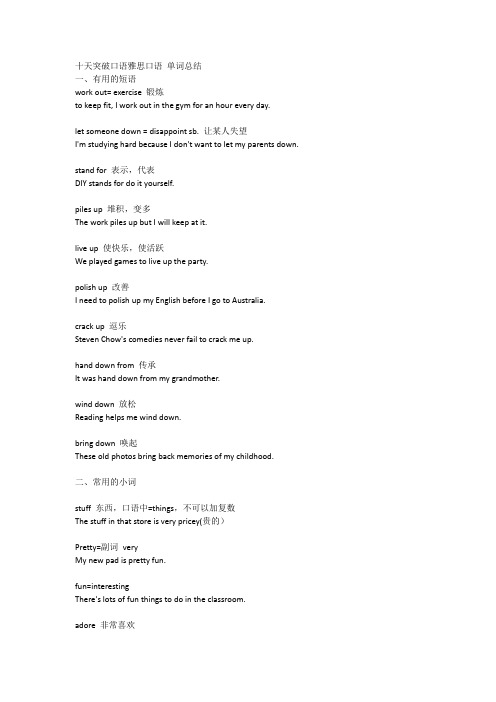
十天突破口语雅思口语单词总结一、有用的短语work out= exercise 锻炼to keep fit, I work out in the gym for an hour every day.let someone down = disappoint sb. 让某人失望I'm studying hard because I don't want to let my parents down.stand for 表示,代表DIY stands for do it yourself.piles up 堆积,变多The work piles up but I will keep at it.live up 使快乐,使活跃We played games to live up the party.polish up 改善I need to polish up my English before I go to Australia.crack up 逗乐Steven Chow's comedies never fail to crack me up.hand down from 传承It was hand down from my grandmother.wind down 放松Reading helps me wind down.bring down 唤起These old photos bring back memories of my childhood.二、常用的小词stuff 东西,口语中=things,不可以加复数The stuff in that store is very pricey(贵的)Pretty=副词veryMy new pad is pretty fun.fun=interestingThere's lots of fun things to do in the classroom.adore 非常喜欢I adore that singer.shortly= soonI'll get these things done shortly.spot 1看见=see I spotted some squirrels and woodpeckers in Stanley park.2 地方=place It looks like a nice spot for a picnic.eye-opening 是地道的英文,让人大开眼界的Trips to other countries can be really eye-opening.decent=quite good 不错的,挺好的This job offers a decent salary and an impressive set of benefits.hang out=玩儿,可以代替play,但是不能接宾语I often hang out in bars at weekend.I often hang out with them at the park.kind of=sort of 有点……,=somewhatMy boss is kind of hard to get along with.like 比如说,像是,差不多是I bought lots of stuff, like carrots ,beef and salmon.That program is like,...boring.in a row=one after another 连续地出现或发生Jeremy Lin led New York Knicks to seven wins in a row.Patricia passed four exams in a row last week.a trade-off 有得就有失There is a trade-off between the benefits of the medicine and the risk of side effects. Gracie had to make a trade-off between her job and her family.entire=whole/completeDaniel ate the entire cake and made no apology for that.Our situation is entirely different from theirs.Jessica is not entirely sure if she can get a nice job after graduation.......as well 也=.....tooBeijing is exciting for its nightlife. And it's culturally attractive as well.....is a piece of cake=...is a snap=...is a breeze 小菜一碟The IELTS speaking test is just a breeze if you know all the tricks about it.during 在...的时候We go hiking and camping during holidays.Know...inside out=know...backwards and forwards 精通He knows computers backwards and forwards.I'm all for 我完全支持某事物I've got nothing against change-I'm all for it.is no picnic=is a pain in the neck 很折磨人Getting the homework done everyday is no picnic....really bothers me./...is getting on my nerves 让我很烦The noise really bothers me./ The noise is getting on my nerves.kick back and relax=let one's hair down 放松At parties, we just kick back and relax.a couple of 几个I stayed in France for a couple of weeks.a bunch of=some 一些I went there with a bunch of new friends.dozens of 几十I just bought dozens of gifts online.loads of=piles of=tons of=a multitude of 很多= lots ofI've got loads of works to get through before tomorrow.make sense 合理= be reasonableThe plot(剧情)of that movie didn't make any sense...., you name it=and the list goes on and on 应有尽有Beijing has traditions, modern lifestyles, tasty food, exciting night-life, beautiful people...you name it.by doing that, I kill two birds with one stone 一举两得When i travel around, i take photos and then sell them online. So you see, I just kill two birds with one stone....is the best+名词,hands down. ....绝对是最....的The new IPad is the best tablet I've ever seen, hands dow....would be the last thing I want to do ....是我人生最不想做的Doing the dishes would be the last thing I want to do.that's the way the ball bounces. 命中注定就是这样了Lots of people got fired. Too bad. But that's the way the ball bounces in a recession.get the hang of 基本了解了怎样做某事"I've never used a word processor before.""Don't worry-you'll get the hang of it shortly."get...down pat 完全掌握了If you just memorize all the answers, even if you get all the answers down pat, there may still questions you haven't thought of during the test. So,....What a shame! 太可惜了They lost that match. What a shame!...is nonexistent 压根就不存在Some scientist believe global warming is non-existent. Some of them even argue that the earth is actually getting colder.end up verb+ing 常用来描述某人或某事物最终处于某种状态I ended up having to do all the work myself.suit someone well/ suit someone's needs 适合The bustling city life suits Jeremy better.。
慎小嶷 《十天突破雅思写作》总结

慎小嶷《十天突破雅思写作》总结注意:1、作文要有实质内容。
2、6分:260~270个词左右;6、5分:280个词以上。
3、没有必要一定写长难句,但要提高句子的准确度和多样性。
必须在对英语造句知识准确理解和把握的基础上流畅地写出复杂的长句子,而不是刻意、机械地拉长句子。
(准确、严密、多样、清晰)4、对于零星出现的少量拼写错误,只要不引起歧义,是不会导致严重扣分的,但要努力减少作文里出现拼写错误的可能。
5、考场里没有时间打草稿,但可以在印考题的试题纸上把看到题目后头脑里闪现出的ideas、考前准备的相关加分词汇和句型大致记录一下。
6、当考官要求停笔时即使还没有写完也一定要停下来,否则会被判为违纪行为。
7、考前练习一定要尽可能模拟实战:下载标准格式的答题纸;用铅笔写作,每行10~12个单词;严格控制时间,Task1不应超过25 min,Task2不应超过45 min。
备考初期,可将Task1和Task2分开练习,但在考前一周内,必须演练完整的写作考试全程,严格控制时间,写完后再核对或请有经验的老师批改。
8、Task1 图表题Task2 议论题Task achievement针对题目所给的图形详细介绍信息Coherence and cohensionLexical resourceGrammatical range and accuracyTask response论证要扣题且强有力Coherence and cohensionLexical resourceGrammatical range and accuracy客观、准确、详尽主观性使用的词汇有限,句式要求不高词汇量要求较高,句式灵活多变最高境界:让考官即使不看图表,只看考生作文也能够准确地想象出图表的内容在观点上没有标准答案,重点在于是否可以用英文比较准确地表达并且强有力地支持这种观点;不用纠结怎样的观点才是“正确的”,而应考虑这道题持怎样的论点才能写起来最顺手,最能充分利用自己考前准备的内容。
慎小嶷的十天突破雅思写作范文解析

慎小嶷的十天突破雅思写作范文解析多多研读别人的优秀范文,再进行仿写和改进,也不失为提升雅思写作能力的有个好办法,下面小编给大家带来慎小嶷的十天突破雅思写作范文解析,希望可以帮助到大家。
【慎小嶷——十天突破雅思写作】地图题真题9分范文地图题真题【The map below is of the town of Garlsdon. A new supermarket ( S) is planned for the town. The map shows two possible sites for the supermarket.】注意地名:Garlsdon;Hindon;Cransdon.调皮的括号君:( S1)以及:no-traffic zone;out-of-town.In contrast, the suggested location, S2, is right in the town center, which would be good for local residents. Theoretically, the store could be accessed by road or rail from the surrounding towns, including Bransdon. But in reality, as the central area is a no-traffic zone, cars would be unable to park and access would be difficult. Overall, neither site is appropriate for all the towns, but for customers in Cransdon, Hindon and Garlsdon, the out-of-town site ( S1) would probably offer more advantages.相反,备选地点S2正好位于镇中心,这就方便了当地居民。
十天突破雅思口语(重点语句)

DAY 1 最真实的谎言1、Do you enjoy looking for gifts for people?(why/why not?) Yes, Ido because selecting the right gifts can be really fun. The choices may seem endless, but I always try to consider myfriends’interests and personality. I can ’treally afford expensive gifts. But I believe it ’s the thought that counts.2、Do you sometimes prefer to send a text message instead oftelephoning? (Why? /why not?)Yes. I prefer to text when the message I want to sendisn’turgent, because that allows me more time to think things through and allows the receiver more time to think about how to respond. Texting is also much cheaper than calling.3、Do you enjoy the advertisements on television?I would say I enjoy some of them because they are creative andwitty. But it ’strue most ads just spoil the fun of watching TV,and the information they bring us tends to be misleading.4、Do you think it would be a good idea for schools to ask studentstheir opinions about lessons?It may be a good idea if the evaluation is well-managed. Students can get their voices heard when they evaluate the lessons. Then the school will know how to keep up with the students ’demand.But on the other hand, some students ’comments may be unfair,which may hurt their teachers ’feelings.5、Do you like making other people laugh?Sure. I know lots of jokes and really enjoy sharing them with friends of mine. It seems like I just happen to have a unique sense of humor. I tend to believe humor is essential to a good mood at work and at home as well.6、What ’syour favourite subject at school?Humm, I guess it ’s PE, which stand for physical education.Sometimes we call it the gym class, PE not just keeps us physically fit, it gets us more focused on academic subjects as well.7、What ’syour favourite season?Well, I would say⋯summer. Actually, the summer in Beijing isreally hot ⋯scorching! But in summer, my friends and I can just hang out together in places like malls or Starbucks. The summer vacation is long, much longer than the spring break. And thecoolest thing about summer is we can just wear casual clothes like tees and shorts⋯What ’syour favourite colour?Well, to be honest, I don ’treally have an actual favourite colour but I guess if I were buying clothes, then I’d usually go for something like blue or grey—kind of dull colours, nothing too bright.SampleRachel: Say, Kyle, are you ready for the big exam coming up this Friday?Kyle: NO. I guess I’m nowhere near ready. Maybe it’sall because I really have no interest in biology.Rachel: So you’d better start studying.Kyle: I have an idea. The test is on Friday, so maybe on Thursday night you could come over to my apartment and help me cram (突击学习)Rachel: It wouldn ’tbe very smart to try and rush through half a semester’sinformation in just three hour. We could compare notes, anyway.Kyle: I’m busy every night this week. I’ve got a date tonight and tomorrow I ’m playing basketball. I’lljust pull an all-nighter (熬夜学习)Rachel: I don’tthink studying all night is going to do you any good if you fall asleep during the test.Kyle: Humm, I guess you’re right. I’ll change my date to after the test and then I ’llbe free to study this week.To keep fit, I work out (=exercise) in the gym for an hour every day. I’m studying hard because I don’t want to let parents down(=disappoint sb.)DIY stands for Do-It-Yourself.The work piles up (=becomes more) but I will keep at it.We played games to liven up the party. (=to make the party morelively)I need to polish up (=improve) my English before I go to Australia.Steven Chow’s(周星驰 ) comedies never fail to crack me up. (=makeme laugh)It was handed down from my grandmother.Reading helps me wind down (=relax).These old photos bring back memories of my childhood.如果听不懂考官问题,可以下两种方式:1、Could you please rephrase the question?2、Well, my best guess would be⋯Day 2 雅思口语的本质是什么Part1: chatThe Part-1 Topic AreasStudies Language Food Nature Sports&OutdoorActivitiesWork Weather&Season Media Collection PetsBuilding Hometown Arts Clothing Festivals,Holidays&Parties People Reading&Writing Colours Traveling ShoppingThe traffic is always tied up so there's no point in getting a driver's license anyway.Do you like boating?Yes I do, because boating is a good exercise. It burns calories, builds strength and improves balance/coordination. Also, when I ’m out on the water and close to nature, I feel totally free. Nothing can bother me.Do you wish to own a boat? Why?I won’tbe able to find a place to store it, maintenance of a boat can be a lot of work.Do you think it ’simpolite to use mobile phones in public places? Well, it ’s impolite to use mobile phones in a public place like a cinema, library or classroom where people are supposed to be quiet. But I guess it ’s kind of okay to use mobile phones in public places like shopping malls where it ’salways noisy anyway, if we don’tmind others hearing our phone conversation. Part2: descriptionPart3: discussion是风的细语、是雨的柔顺、斑驳了一道道古老的忧伤,刻在了灯火阑珊处 ?是桥的沧桑、是石的痕迹、流年了一首首陈旧的诗韵,铭在了秋月三更天 ?海棠红袖添香,墨迹染血苍凉。
十天突破雅思口语
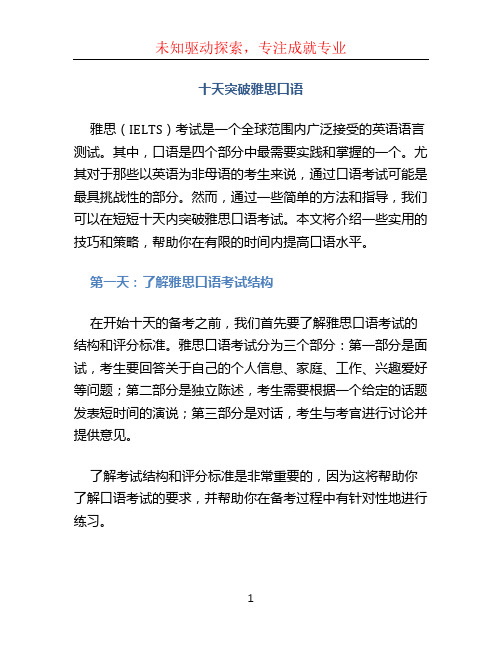
十天突破雅思口语雅思(IELTS)考试是一个全球范围内广泛接受的英语语言测试。
其中,口语是四个部分中最需要实践和掌握的一个。
尤其对于那些以英语为非母语的考生来说,通过口语考试可能是最具挑战性的部分。
然而,通过一些简单的方法和指导,我们可以在短短十天内突破雅思口语考试。
本文将介绍一些实用的技巧和策略,帮助你在有限的时间内提高口语水平。
第一天:了解雅思口语考试结构在开始十天的备考之前,我们首先要了解雅思口语考试的结构和评分标准。
雅思口语考试分为三个部分:第一部分是面试,考生要回答关于自己的个人信息、家庭、工作、兴趣爱好等问题;第二部分是独立陈述,考生需要根据一个给定的话题发表短时间的演说;第三部分是对话,考生与考官进行讨论并提供意见。
了解考试结构和评分标准是非常重要的,因为这将帮助你了解口语考试的要求,并帮助你在备考过程中有针对性地进行练习。
第二天至第四天:词汇积累与表达技巧练习上面提到的三个部分都离不开丰富的词汇和流畅的表达。
在这三天里,你应该着重积累相关的话题词汇,包括与个人生活、社会问题、科技、环境等相关的词汇。
可以使用在线单词表、Flashcards或者参考雅思官方指南中给出的词汇表进行词汇积累。
另外,你还可以练习使用同义词和近义词来丰富你的表达。
这将使你在回答问题时能够更准确和多样地表达自己的意思。
第五天至第七天:口语模拟练习在接下来的三天里,你应该进行口语模拟练习。
找一个志同道合的朋友或语言伙伴,互相交流并进行模拟口语考试。
可以选择一些常见的雅思口语话题,例如旅行经历、文化差异、健康与健身等,通过模拟考试来练习你的口语表达能力和流利度。
在模拟考试过程中,要注意自己的发音、语速和语调。
努力让自己的语言流利自然,同时要注意避免语法错误和用词不当。
第八天:听力练习与口语模仿在第八天,你应该进行一些听力练习,同时进行口语模仿。
选择一些与雅思口语话题相关的录音材料,例如BBC的新闻报道、TED Talks等,并尝试模仿其中的口音、语调和表达方式。
慎小嶷《十天突破雅思口语》总结1精编版
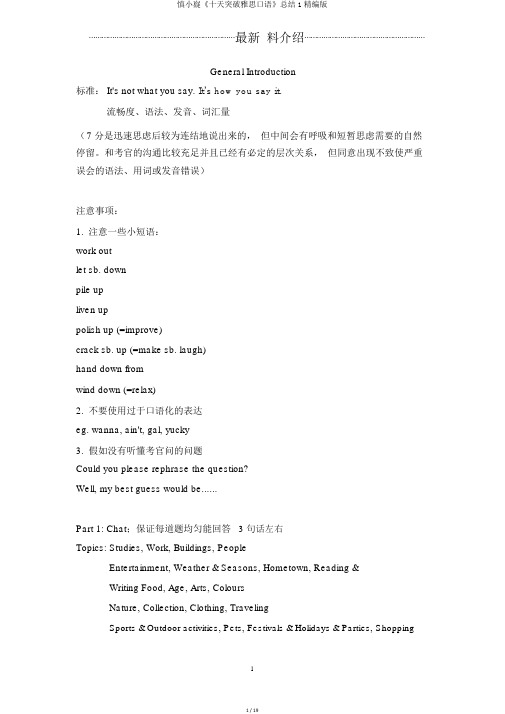
⋯⋯⋯⋯⋯⋯⋯⋯⋯⋯⋯⋯⋯⋯⋯⋯⋯⋯⋯⋯⋯⋯⋯最新料介绍⋯⋯⋯⋯⋯⋯⋯⋯⋯⋯⋯⋯⋯⋯⋯⋯⋯⋯⋯General Introduction标准: It's not what you say. It's how you say it.流畅度、语法、发音、词汇量(7 分是迅速思虑后较为连结地说出来的,但中间会有呼吸和短暂思虑需要的自然停留。
和考官的沟通比较充足并且已经有必定的层次关系,但同意出现不致使严重误会的语法、用词或发音错误)注意事项:1.注意一些小短语:work outlet sb. downpile upliven uppolish up (=improve)crack sb. up (=make sb. laugh)hand down fromwind down (=relax)2.不要使用过于口语化的表达eg. wanna, ain't, gal, yucky3.假如没有听懂考官问的问题Could you please rephrase the question?Well, my best guess would be......Part 1: Chat;保证每道题均匀能回答 3 句话左右Topics: Studies, Work, Buildings, PeopleEntertainment, Weather & Seasons, Hometown, Reading &Writing Food, Age, Arts, ColoursNature, Collection, Clothing, TravelingSports & Outdoor activities, Pets, Festivals & Holidays & Parties, Shopping问题种类: Yes/No 类题Wh-/How 类题Part 2: Description;会有适合的思虑和停留;需要有规划和次序;句式会有一些变化最有价值的信息来自与你在同一个半天内考试的其余考生。
慎小嶷 《十天突破雅思口语》总结1
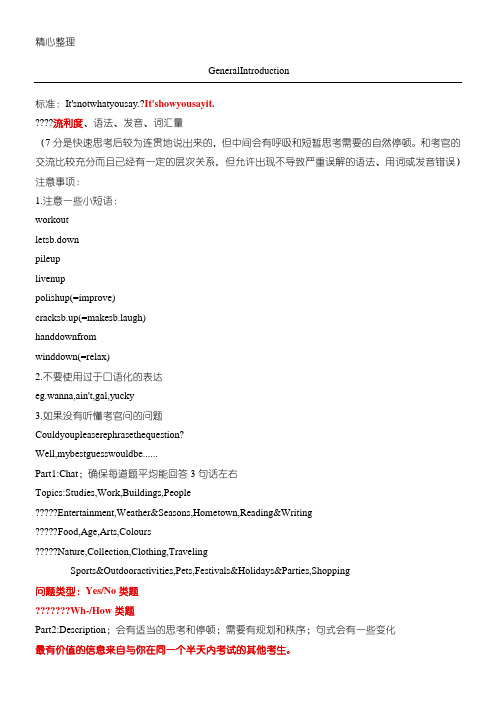
GeneralIntroduction标准:It'snotwhatyousay.?It'showyousayit.????流利度、语法、发音、词汇量(7分是快速思考后较为连贯地说出来的,但中间会有呼吸和短暂思考需要的自然停顿。
和考官的交流比较充分而且已经有一定的层次关系,但允许出现不导致严重误解的语法、用词或发音错误)注意事项:1.注意一些小短语:workoutletsb.downpileuplivenup2.3.Part1:Chat?????Entertainment,Weather&Seasons,Hometown,Reading&Writing?????Food,Age,Arts,Colours?????Nature,Collection,Clothing,TravelingSports&Outdooractivities,Pets,Festivals&Holidays&Parties,Shopping问题类型:Yes/No类题???????Wh-/How类题Part2:Description;会有适当的思考和停顿;需要有规划和秩序;句式会有一些变化Topics:Objects,Events,Places,Abstracts,PeoplePart3:Discussion;多数时候与Part2所考卡片的话题有关,但也有可能离开卡片的话题;会用到很多表示逻辑关系的连接词;比Part1和Part2更正式,但没有工作面试正式;要论述好自己的观点Topics:Buildings?????Language,Weather&Season,Cities&Countryside,Reading&Writing?????Food&Health,Media&Celebrities,Arts?????Nature,Collection,Clothing,Traveling?????Sports&Games,Animals,Festivals&Parties,Shopping??????????????Part1/3stuff(不能不错的宾语小菜一碟全支持磨人),?reallybothersme/isgettingonmynerves,?kickbackandrelax/letone'shairdown(放松),?acoupleof,abunchof(一些),dozensof,?loadsof/pilesof/tonsof/amultitudeof,?makesense(合理),younameit/andthelistgoesonandon(应有尽有),Bydoingthat,Ikilltwobirdswithonestone,?isthebest+noun,handsdown(...绝对是最...的),wouldbethelastthingIwanttodo,?That'sthewaytheballbounces(命中注定就是这样了),getthehangof(基本了解),get...downpat(完全掌握了),?Whatashame,isnonexistent,endupdoing,suit...well/suit...'sneeds 2.Slangwordsandphrases(P53-P54)elsick),pricey,beats,notuptopar(=notsatisfactory),?isadrag(=isboring),thedailygrind(=theboringthingyouha vetodoeveryday),istotallygross,?isovermyhead(=ishardtounderstand),drivemeupthewall(=drivemecrazy),h aveaball/blast(=haveagoodtime),?funky,outfit,flashy(=attention-getting),snazzy(=beautifulandexpensive), weird/odd,corny(=oldanduninteresting),?agamer/vid-kid(=aperonwholikesplayingvideogames)3.Alternativestosomeexcessively-usedwords(P55-P60)1)关于数量2)关于活动3)关于物品4)关于人567891011承担),?payoff(有回报),takeup(开始),thinkof,workout,ripsb.off(买东西被骗了),take...intoaccount,?getridof,sleepin(睡懒觉),getsoworkedup(很紧张),adaptto,participatein,copewith,getstuck,?stickto,brushupon(突击复习),burnout(累垮了),winddown(=relax),letdown,livenup?expandourknowledge/outlook/enlargeoutvision,canneverhurt/wo n'thurt(不会有坏处的),easeyourmind,releasepressure6.Super-cooladjectivesandadverbs(P65-P70)1)Adjectives3)Antonymysforpros∙100wordsinPart2(P72-P77)1.按感官分类1)视觉2)听觉3)嗅觉4)味觉5)感觉6)休闲2.1)Cities2)3)4)People5)Animals6)Objects∙注意事项:1.?2.不要换为∙1.因果so/sothat/therefore(在地道口语中用得并不算多)because/'cause/coz(不正式,不宜过度使用)2.让步eventhoughevenifalthough3.转折...,thoughbuthowever4.递进apartfrombesides5.修饰when/where6.对比in/bycontrast7.likesuchas?8.其他aswellaswellasintermsofinsteadof/ratherthan inparticularasfaras...(isconcerned/goes) 9.不是连词却胜似连词的表达tendto?get∙Essentialwordsandphrases1.WordsAsIseeit,.../Iguess.../Isuppose...Asfor.../Whenitcomesto.../Talkingabout...(英式)/Speakingof...(美式)tonsof/loadsof/pilesof/amultitudeofawealthof+积极的事物...andthelike/...andstufflikethat/...andwhatnot2.Phrasesusedtoisthenormisaluxurywon'thurtenablesb.todosth.haveahardtimedoingsth.很难去做sth.isapproaching/justaroundthecorner∙特殊的句子1.虚拟语气2.倒装句notonly/only放在句首雅思口语的段落Part1&Part31.“起—承—合”结构1)起./Thatistosay,.../...i.e..../Bytheway,...Mostimportantly,.../especially.../particularly.../inparticular3)合Allinall,.../Inanutshell(写作不宜使用)/Inshort,.../Soit'snoexaggerationtosaythat.../That'sprettymuchit./That'sallIcanthinkofnow.注意:结尾句不可说“Inaword”,它后面只能跟一个单词,而不能跟一个句子。
雅思资料汇总小结

雅思各方面资料汇总小结写作慎小嶷模板分5分慎用!@~.:《雅思8分万能作文》背《十天》上的高分词汇论坛:51雅思、太傻超级论坛、寄托,不论大小作文都要背范文。
《十天攻破雅思口语》(第三版)《十天攻破雅思写作》(第四版)口语:口语机经所以最好就是拿到一个卡片题,就自己说上五遍,然后在本子里写下提纲,别人说这个方法更好(口音问题不用纠结,哪种都行)阅读:平行阅读法就一句话,看完一段立马做相应的题目这样文章读完题目做完阅读不回头一眼扫过好几个单词,叫做意群读法生词/障碍词汇总结(20个左右),复杂句总结(4-5句即可),全文翻译(翻译后要对照答案),试题分析,错误及出题陷阱分析。
虽然这项工作很多很恐怖,但是坚持按照这个步骤做完3本书之后就会发现阅读能力提升很快,拿到题几乎就知道了题目陷阱在哪里,这种方法真的是很好很强大。
听力:听写放一句录音暂停然后在纸上写下你听到的句子然后再放第二句再写下来记不住的倒回去重听写完全文这个只要写完一遍全文就ok了,但是才开始做的话,会觉得有挫败感,并且很累,习惯后就好了,并且这个方法是绝对有效地,只要你能做到流利的在一两遍之类听写出一篇lecture,那么IELTS听力是基本没问题的第一步,做完不要立即对答案,要反复听,直到自己可以将答案听出为止。
然后进行第二步,听写练习。
不必要全听写,把错的多的section听写即可。
要知道,纯听写对应试帮助并不大,所以第一步是必不可少的啊!谨记!泛听:Listen to this 2(新东方强烈推荐)网上下载精听2个半小时,泛听1个半小时,也就是每天4小时的时间最好的一本书就是《北语黑眼睛技能训练》单词:打基础背单词的时候,就应该分别背“阅读词汇”以及“写作词汇”还有“句型”(两个月的时间应该可以背出来的)。
模拟考试:~在考前最后的一周,或是两周,要坚持天天做套题。
只有这样才能了解考试流程,分配好考试时间,胸有成竹地进入考场。
真的很重要,一定要重视做套题,并且要严格计算时间,严格按照考试流程。
[DOC]-慎小嶷:十天突破雅思IELTS写作完整真题库.doc
![[DOC]-慎小嶷:十天突破雅思IELTS写作完整真题库.doc](https://img.taocdn.com/s3/m/99875be64793daef5ef7ba0d4a7302768e996f13.png)
[DOC]-慎小嶷:十天突破雅思IELTS写作完整真题库慎小嶷:十天突破雅思IELTS写作完整真题库智课网IELTS备考资料慎小嶷:十天突破雅思IELTS写作完整真题库摘要: 慎小嶷:十天突破雅思IELTS写作完整真题库,写作是很多考生都头疼的一部分,今天小马过河小编为大家带来关于慎小嶷:十天突破雅思IELTS写作完整真题库的相关介绍,希望能对大家的雅思考试有所帮助,更多雅思考试机经、雅思报名相关资料尽在小马科技雅思频道官网。
慎小嶷:十天突破雅思 IELTS写作完整真题库,以下内容是小编带来的关于慎小嶷:十天突破雅思IELTS写作完整真题库的详细介绍,大家快来看吧,可直接点击文章内的链接进行下载即可。
扫码获取雅思历年真题内容推荐本书是著名畅销书《十天突破雅思写作》的姐妹篇。
书中收录了在亚太、欧洲和北美三大考区历年来所使用的雅思写作完整真题库,根据不同分数段的范文特点对范文的写作手法和语言特色进行了详尽的比较与鉴别,并且紧密地结合了剑桥官方的最新评分细则。
本书还提供了详尽的雅思地图题(Map)写作指南,而且全书解释例句均取自剑桥官方唯一指定的Cambridge AdvancedLearner's Dictionary。
作者简介我的中文名字叫慎小嶷,英文名字叫Patrick,很多学生也喜欢简单地称呼我Pat。
长期在美国、加拿大两国生活,让我对英语这种世界上越来越多的人之间使用的交流工具有了更直接的体验。
2004年我开始在学校的几个外地分校教授雅思课程,2005年起开始在北京总校教授雅思写作、口语两门课程。
直到2009年底我回到北美,在北京总校历次统计的学生全年反馈总评中,写作、口语这两科的教师总分排名我都名列前茅,“主讲教师”这四个字应该受之无愧目录致读者:榜样的作用英文自序Day 1 学而时习之:教育类真题库与各分数段范文剖析解读 Education类真题库Education 类各分数段范文剖析教育类范文一到底什么是6分?一只6分烤鸭的辛酸血泪史教育类范文二新生下乡应该缓行教育类范文三到底什么是7分?对两篇7分范文的比较研究教育类范文四因材施教还是搞一刀切教育类范文八让学生决定自己学什么是否靠谱教育类范文九请勿曲解男女平等教育类范文十高等教育对城乡学生的公平性教育类范文十一缺乏外语天赋是否还要知难而上教育类范文十二研究生经费何去何从教育类范文十三拒绝做书虫儿以上就是小马过河小编为大家带来的关于慎小嶷:十天突破雅思IELTS写作完整真题库一书的详细介绍,供大家参考和学习,希望在小编的帮助下,考生们能早日通过雅思考试,最后小编祝大家都能取得好成绩。
- 1、下载文档前请自行甄别文档内容的完整性,平台不提供额外的编辑、内容补充、找答案等附加服务。
- 2、"仅部分预览"的文档,不可在线预览部分如存在完整性等问题,可反馈申请退款(可完整预览的文档不适用该条件!)。
- 3、如文档侵犯您的权益,请联系客服反馈,我们会尽快为您处理(人工客服工作时间:9:00-18:30)。
General Introduction标准:It's not what you say. It's how you say it.流利度、语法、发音、词汇量(7分是快速思考后较为连贯地说出来的,但中间会有呼吸和短暂思考需要的自然停顿。
和考官的交流比较充分而且已经有一定的层次关系,但允许出现不导致严重误解的语法、用词或发音错误)注意事项:1. 注意一些小短语:work outlet sb. downpile upliven uppolish up (=improve)crack sb. up (=make sb. laugh)hand down fromwind down (=relax)2. 不要使用过于口语化的表达eg. wanna, ain't, gal, yucky3. 如果没有听懂考官问的问题Could you please rephrase the question?Well, my best guess would be......Part 1: Chat;确保每道题平均能回答3句话左右Topics: Studies, Work, Buildings, PeopleEntertainment, Weather & Seasons, Hometown, Reading & WritingFood, Age, Arts, ColoursNature, Collection, Clothing, TravelingSports & Outdoor activities, Pets, Festivals & Holidays & Parties, Shopping问题类型:Yes/No类题Wh-/How类题Part 2: Description;会有适当的思考和停顿;需要有规划和秩序;句式会有一些变化最有价值的信息来自与你在同一个半天内考试的其他考生。
Topics: Objects, Events, Places, Abstracts, PeoplePart 3: Discussion;多数时候与Part 2所考卡片的话题有关,但也有可能离开卡片的话题;会用到很多表示逻辑关系的连接词;比Part 1和Part 2更正式,但没有工作面试正式;要论述好自己的观点Topics: BuildingsLanguage, Weather & Season, Cities & Countryside, Reading & WritingFood & Health, Media & Celebrities, ArtsNature, Collection, Clothing, TravelingSports & Games, Animals, Festivals & Parties, ShoppingVolunteers & Charities, Employment问题类型:经常会有1-2个涉及比较不同讨论对象间的差异的问题经常会有1-2个涉及利弊的问题经常会有1-2个要求分析原因或解决方法的问题Part 1/3可以用到的解题技巧:六字诀Time, Cost, Mood, Health, Safety, Knowledge(对于能自己快速想出来答案的问题就不必依赖于六字诀,必须确保流利度)雅思口语的词•Words in the speaking test (P49-P71)1. Colloquial words and phrases (P49-P52)stuff (不能加复数), folks, pretty, fun (=interesting), adore, shortly, spot, eye-opening, decent (不错的), hang out (后面不能直接接宾语), kind of/sort of, like, in a row (=one after another), entire, as well, is a piece of cake/is a snap/is a breeze (小菜一碟), during, know ... inside and outside/backwards and forwards (精通), I'm all for (我完全支持), is no picnic/is a pain in the neck (很折磨人), really bothers me/is getting on my nerves, kick back and relax/let one's hair down (放松), a couple of, a bunch of (一些), dozens of, loads of/piles of/tons of/a multitude of, make sense (合理),you name it/and the list goes on and on (应有尽有), By doing that, I kill two birds with one stone, is the best + noun, hands down (...绝对是最...的), would be the last thing I want to do, That's the way the ball bounces (命中注定就是这样了), get the hang of (基本了解), get ... down pat (完全掌握了), What a shame, is nonexistent, end up doing, suit ... well/suit ...'s needs2. Slang words and phrases (P53-P54)buff/freak/mania (对事物;对人用fan/admirer), nerd/geek, freak out (=be so surprised), let off steam (=release pressure), feel under the weather (=feel sick), pricey, beats, not up to par (=not satisfactory), is a drag (=is boring), the daily grind (=the boring thing you have to do everyday), is totally gross, is over my head (=is hard to understand), drive me up the wall (=drive me crazy), have a ball/blast (=have a good time), funky, outfit, flashy (=attention-getting), snazzy (=beautiful and expensive), weird/odd, corny (=old and uninteresting), a gamer/vid-kid (=a peron who likes playing video games)3. Alternatives to some excessively-used words (P55-P60)1)关于数量2)关于活动3)关于物品4)关于人5)关于爱好6)关于天气7)关于建筑8)关于食品9)关于时间10)关于喜欢/讨厌11)关于频率4. Magical nouns (P61-P62)leisure, mood, ambience, efficiency, smog, necessity, incentive, the pace of life, competition, encouragement, enjoyment, gallery, artworks, pastime, preference, an approach, nutrition, cuisine, status symbol, fragrance, family bonds, potential, employment, blockbuster (大片儿), satisfaction/fulfillment, traffic congestion,rules and regulations, the hustle and bustle (喧闹拥挤), the daily grind, tourist attractions5. Phrasal verbs (P63-P65)check out, figure out (=understand), bring about, carry out, go about (从事), come up with, face up to (承担), pay off (有回报), take up (开始), think of, work out, rip sb. off (买东西被骗了), take ... into account, get rid of, sleep in (睡懒觉), get so worked up (很紧张), adapt to, participate in, cope with, get stuck, stick to, brush up on (突击复习), burn out (累垮了), wind down (=relax), let down, liven up expand our knowledge/outlook/enlarge out vision, can never hurt/won't hurt (不会有坏处的), ease your mind, release pressure6. Super-cool adjectives and adverbs (P65-P70)1)Adjectives2)Adverbs3)Antonymys for pros•100 words in Part 2 (P72-P77) 1. 按感官分类1)视觉2)听觉3)嗅觉4)味觉5)感觉6)休闲2. 按话题分类1)Cities2)Natural beauty3)Buildings4)People5)Animals6)Objects•287 words in Part 3 (P343-P355)雅思口语的句子注意事项:1. 尽量少用长、难、怪的句子。
